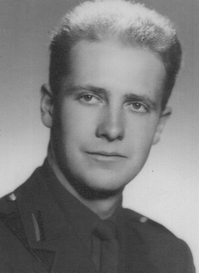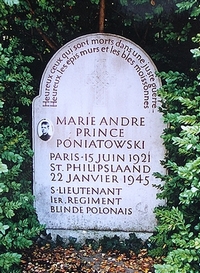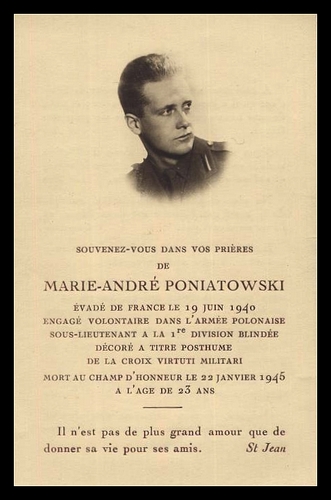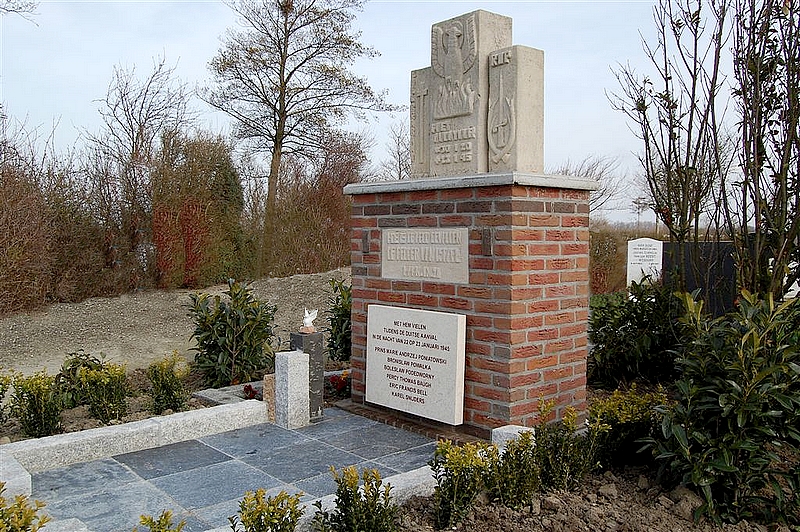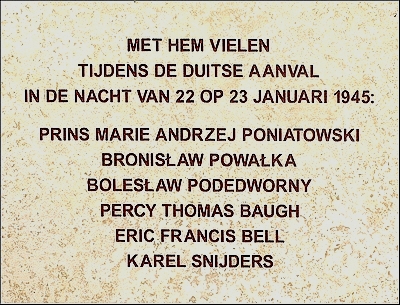|
Ppor. Poniatowski was killed by a rifle bullet during a confusing fire-fight with German intruders whilst he was standing in the turret of his tank.
In the book "The Soldiers of General Maczek" (ISBN PL 83-914145-8-2) edited by Zbigniew Mieczkowski is to be found how captain Jan Potworowski recalls the tragic events he witnessed during the action at St Philipsland on "het Zijpe":
In January 1945, after regrouping at the beginning of the Von Runstedt offensive, the First Armoured Regiment came under the command of the First British Corps and moved from the Tilburg - Breda region to an area close to the Maas Rhine Estuary.
Looking at a map of Holland it is difficult to judge where it is the Rhine and where it is the Maas. The area is a delta of large rivers with many flat muddy islands. To avoid controversy, the Dutch called it Hollandsch Diep. Not far from the estuary there is a small narrow headland with an asphalt road leading to a small village called Sint Philipsland, with a picturesque windmill and tall water tower.
When the First Armoured Regiment arrived, tank squadrons were positioned along the river. Two platoons of tanks were detailed to take up positions on the Sint Philipsland headland, together with a detachment of Dragoons and a unit from 62 A/T Regiment acting as infantry. Outposts were placed on the river and an artillery observation post was installed in the water tower. The duties of the defence were monotonous.
Some wild mortar and machine gun fire was the only indication that the other side of the river was occupied and not empty as it appeared to the onlooker. So passed days and desperately long nights. Tank crews, when not on duty spent time constructing heating appliances in empty houses they occupied to fight the only active enemy the frost.
Sometimes, English artillery joined in, directed by observers in the water tower. The only entertainment was to watch the flying bombs, which had been released somewhere in Holland, heading for the port of Antwerp. The only movement was the patrols of the Dragoons and the changing of the outposts by the English.
The tank crews felt unwanted and superfluous. Boredom reigned. All talk was about cold, night duties and lack of leave. During the day sometimes there would be some shooting at distant targets. During the night, protection of the tanks and themselves.
There was, however one man who was not bored. A young 2nd-lieutenant, tall with blue eyes and blond hair. He was in charge of the two tank platoons which acquired a grandiose name "armoured group". He enjoyed the command and the whole day was busy inspecting tanks, checking lines of fire, conferring with artillery observers and visiting adjoining units.
In the evenings he would sit in the house which he called his HQ, planning actions for the next day. When in a very good mood, he would take out his flute and give a concert, always starting with 'Sur le Pont d' Avignon'. There was something very strange in all this. Here is a young boy in the Polish army in a forsaken Dutch village.
He belonged to an old Polish family with great traditions but which had left Poland many years earlier. His grandfather father and himself were French citizens and only he could speak Polish - with a heavy foreign accent. There was something in his heritage that made him, when France feIl under German occupation, cross the Channel in a rowing boat to join the Polish Army in England.
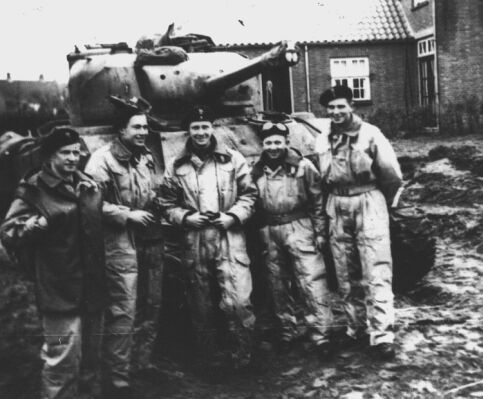
Lt. Poniatowski, standing in the centre, with his crew.
The day of 22nd January was no different from any other but for the snow which had fallen a few days earlier, making the landscape more empty than before. Late that evening the 2nd-lieutenant went to Sector Command for a briefing. While he was there the defence was alerted by extremely heavy mortar and machine'gun fire. A large German patrol had also landed on the south bank. As it came out later, the aim of the patrol was to blow up the water tower and to remove the artillery observer
The Germans divided into three groups, attacking the infantry outpost, the tower and came close to the tanks. The 2nd-lieutenant got into the scout car and soon afterwards, driving through heavy mortar fire, reached his tank. The crews were already in their tanks, but no action was possible. It was pitch black.
Our own infantry was in front. He inspected his tanks and contacted the infantry on mounting his tank. The platoons were under heavy mortar and machine gun fire. There were already casualties, with one killed and one wounded. The 2nd-lieutenant was staring into the darkness, trying to see what was happening.
Suddenly, he was wounded by a rifle bullet and dropped into the tank. Soon, a large explosion shook the air. The water tower had been blown up. The Germans had achieved their aim and withdrew quickly to the other side of the river.
2nd-lieutenant Prince Andrzej Maria Poniatowski died while his crew was carrying him to the distant aid post. Some time later the Commander of the Division, Lieutenant General S. Maczek handed a silver cross - Virtuti Militari, the greatest Polish decoration for bravery - to the 2nd-Lieutenant's father The same decoration was worn by Prince Jozef Poniatowski, the great Polish military leader whose name is inscribed on the Arc de Triomphe in Paris.
Till sofar cpt. Podworowski.
Out of the War Diary of the British 62 Anti Tank R.A.:
Italicized texts added
22 January 1945
01.55 hour
Enemy patrol landed on St. Philipsland (approx. strength 50) forward
positions heavily mortared and post at MR 496453 (de Stelberg) was overrun.
Reinforcement sent from Battery HQ 245 RA and from
1 Polish Armoured Regiment.
Object of patrol appeared to be blow up 245 Rgts. Observation Post at
MR. 492447 (water-tower) which not succeeded in doing.
Situation was restored at 02.50 hours.
Casualties as following:
62 Anti Tank Regiment:
Killed: lt. E.F. Bell R.A. and one OR (Gunner P.T. Bough died of wounds)
Missing: 2 OR's believed to be POW (Prisoner of War))
Wounded: 6 OR's
1 Polish Armoured Regiment:
Killed: 1 officer and 1 OR
Wounded: 1 OR
Dutch Task Troops:
Killed one OR
Till so far the War Diary.
Notes:
62 Anti Tank Regiment:
lt. E.F. Bell and gunner P.T. Bough both of the 62 A.T. Regiment have
been buried in the Roman Catholic Cemetery in the town of Roosendaal, the Netherlands.
1st Polish Armoured Division:
Ppor. Poniatowski Marie Andrej and st.strz. Powałka Bronisław killed in action.
St.drag. Podedworny Bronisław died of wounds.
Dutch Task Force being "10e Compagnie Stoottroepen Brabant":
Petrus Antonius Maria Avontuur, killed in action.
In the town of Breda is a street who bears his name: "Piet Avontuurstraat".
|
